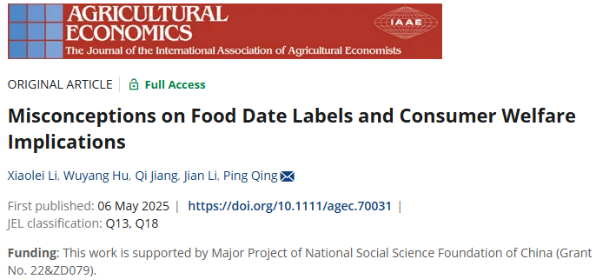近日,伟德BETVLCTOR官网青平教授与西北农林科技大学伟德BETVLCTOR1946始于英国李晓磊讲师、美国俄亥俄州立大学农业、环境与发展经济学系胡武阳教授、美国克莱姆森大学农业科学系博士后蒋奇、伟德BETVLCTOR官网李剑教授合作撰写的论文“Misconceptions on Food Date Labels and Consumer Welfare Implications”在国际农经期刊Agricultural Economics发表。青平教授为本文唯一通讯作者。该文探讨了我国现行保质期标签误读对消费者购买行为以及福利的影响,研究发现,中国消费者对现行食品保质期标签存在误读,误读显著影响消费者的购买行为并造成福利损失。本研究向消费者提供不同保质期标签用语的定义时,其购买行为会进行相应调整。此外,本研究对不同保质期标签的福利模拟表明,在允许存在误读的前提下,将当前的“此日期前销售”标签(中国现行保质期标签官方定义)更换为“此日期后变质”标签能够带来最大幅度的福利提升。食品类型的异质性也会在标签误读条件下影响消费者的购买行为及福利损失。研究结果表明,在能够引导消费者正确理解的前提下,为不同食品类型提供差异化的保质期标签可能更具政策效果。本研究对于制定在单一标签用语系统下的相关食品管理政策具有一定的启示意义。
据悉,Agricultural Economics是农林经济管理领域重要期刊,最新影响因子为4.5。该研究得到国家社科重大项目(No.22&ZD079)的资助。

英文摘要
When multiple food date label phrases are allowed, consumers may misinterpret these labels, causing inefficiency. Using data collected in China, we find considerable consumer misinterpretation even when only one type of food date label is permitted by regulation. Furthermore, consumer preference diverges according to their own interpretation of the label and depending on the type of food. Misinterpretation also leads to consumer welfare loss. Through a value of information (VOI) framework and when misinterpretation is taken into consideration, we show that changing a Sell by label to a Not use if after label generates the largest welfare gain. Our findings advise food manufacturers and policymakers on understanding consumer perspectives of food date labels and creating efficient labeling regulations given consumer misinterpretation.
中文摘要
当允许使用多种食品保质期标签用语时,消费者可能会误读这些标签,从而导致效率损失。基于中国的消费者数据,研究发现即使在法规只允许使用一种食品保质期标签的情况下,消费者的误读依然相当普遍。此外,消费者的偏好会因其对标签的理解不同以及食品类型的不同而产生差异。误读还会导致消费者福利损失。借助信息价值(VOI)框架,并考虑误读的前提下,本文发现将“此日期前销售(Sell by)”标签改为“此日期后变质(Not use if after)”标签能够带来最大的福利提升。本研究结果为食品生产商和政策制定者提供参考,有助于理解消费者对食品保质期标签的认知,并在消费者存在误读的背景下制定更为高效的标签监管政策。
全文链接:https://onlinelibrary.wiley.com/doi/10.1111/agec.70031
文字:王敬斌
审核:李谷成
责任编辑:魏哲焕
编辑:王之学




